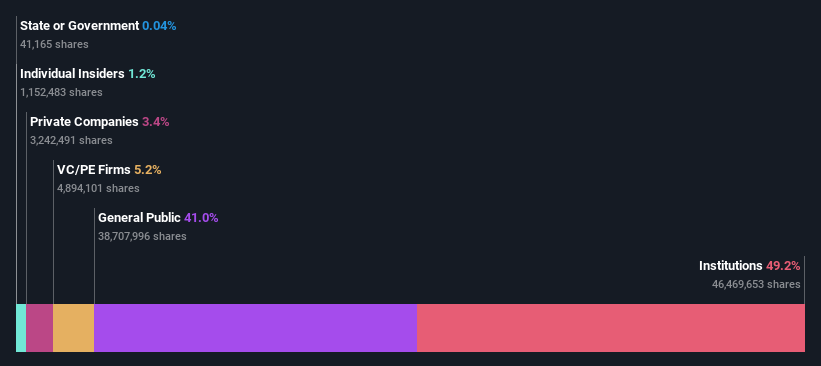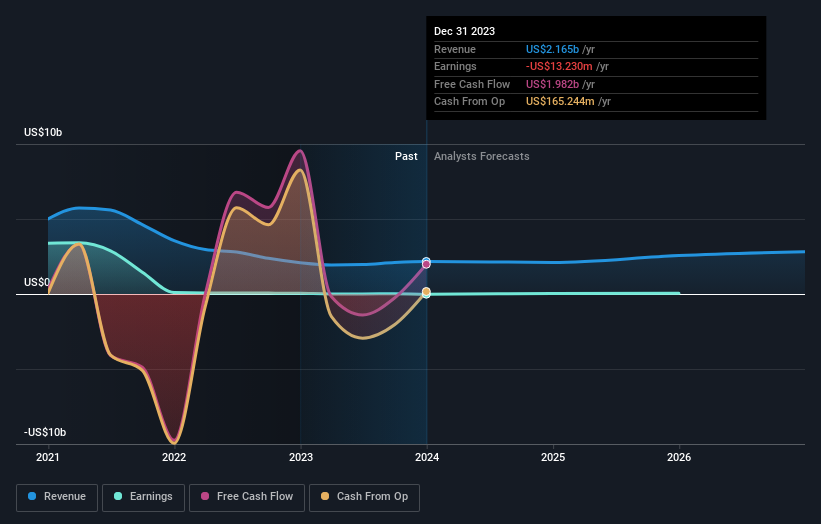- United States
- /
- Diversified Financial
- /
- NYSE:UWMC
Institutional investors are UWM Holdings Corporation's (NYSE:UWMC) biggest bettors and were rewarded after last week's US$74m market cap gain

Key Insights
- Significantly high institutional ownership implies UWM Holdings' stock price is sensitive to their trading actions
- A total of 23 investors have a majority stake in the company with 50% ownership
- Analyst forecasts along with ownership data serve to give a strong idea about prospects for a business
To get a sense of who is truly in control of UWM Holdings Corporation (NYSE:UWMC), it is important to understand the ownership structure of the business. We can see that institutions own the lion's share in the company with 49% ownership. Put another way, the group faces the maximum upside potential (or downside risk).
And as as result, institutional investors reaped the most rewards after the company's stock price gained 12% last week. The one-year return on investment is currently 68% and last week's gain would have been more than welcomed.
Let's take a closer look to see what the different types of shareholders can tell us about UWM Holdings.
Check out our latest analysis for UWM Holdings

What Does The Institutional Ownership Tell Us About UWM Holdings?
Institutions typically measure themselves against a benchmark when reporting to their own investors, so they often become more enthusiastic about a stock once it's included in a major index. We would expect most companies to have some institutions on the register, especially if they are growing.
As you can see, institutional investors have a fair amount of stake in UWM Holdings. This can indicate that the company has a certain degree of credibility in the investment community. However, it is best to be wary of relying on the supposed validation that comes with institutional investors. They too, get it wrong sometimes. When multiple institutions own a stock, there's always a risk that they are in a 'crowded trade'. When such a trade goes wrong, multiple parties may compete to sell stock fast. This risk is higher in a company without a history of growth. You can see UWM Holdings' historic earnings and revenue below, but keep in mind there's always more to the story.

We note that hedge funds don't have a meaningful investment in UWM Holdings. Our data shows that The Vanguard Group, Inc. is the largest shareholder with 9.2% of shares outstanding. With 8.2% and 5.2% of the shares outstanding respectively, FMR LLC and Platinum Equity, LLC are the second and third largest shareholders.
After doing some more digging, we found that the top 23 have the combined ownership of 50% in the company, suggesting that no single shareholder has significant control over the company.
Researching institutional ownership is a good way to gauge and filter a stock's expected performance. The same can be achieved by studying analyst sentiments. Quite a few analysts cover the stock, so you could look into forecast growth quite easily.
Insider Ownership Of UWM Holdings
The definition of an insider can differ slightly between different countries, but members of the board of directors always count. Management ultimately answers to the board. However, it is not uncommon for managers to be executive board members, especially if they are a founder or the CEO.
Most consider insider ownership a positive because it can indicate the board is well aligned with other shareholders. However, on some occasions too much power is concentrated within this group.
We can see that insiders own shares in UWM Holdings Corporation. In their own names, insiders own US$8.2m worth of stock in the US$676m company. Some would say this shows alignment of interests between shareholders and the board. But it might be worth checking if those insiders have been selling.
General Public Ownership
With a 41% ownership, the general public, mostly comprising of individual investors, have some degree of sway over UWM Holdings. This size of ownership, while considerable, may not be enough to change company policy if the decision is not in sync with other large shareholders.
Private Equity Ownership
With a stake of 5.2%, private equity firms could influence the UWM Holdings board. Sometimes we see private equity stick around for the long term, but generally speaking they have a shorter investment horizon and -- as the name suggests -- don't invest in public companies much. After some time they may look to sell and redeploy capital elsewhere.
Private Company Ownership
Our data indicates that Private Companies hold 3.4%, of the company's shares. It's hard to draw any conclusions from this fact alone, so its worth looking into who owns those private companies. Sometimes insiders or other related parties have an interest in shares in a public company through a separate private company.
Next Steps:
It's always worth thinking about the different groups who own shares in a company. But to understand UWM Holdings better, we need to consider many other factors. Like risks, for instance. Every company has them, and we've spotted 2 warning signs for UWM Holdings (of which 1 shouldn't be ignored!) you should know about.
Ultimately the future is most important. You can access this free report on analyst forecasts for the company.
NB: Figures in this article are calculated using data from the last twelve months, which refer to the 12-month period ending on the last date of the month the financial statement is dated. This may not be consistent with full year annual report figures.
New: AI Stock Screener & Alerts
Our new AI Stock Screener scans the market every day to uncover opportunities.
• Dividend Powerhouses (3%+ Yield)
• Undervalued Small Caps with Insider Buying
• High growth Tech and AI Companies
Or build your own from over 50 metrics.
Have feedback on this article? Concerned about the content? Get in touch with us directly. Alternatively, email editorial-team (at) simplywallst.com.
This article by Simply Wall St is general in nature. We provide commentary based on historical data and analyst forecasts only using an unbiased methodology and our articles are not intended to be financial advice. It does not constitute a recommendation to buy or sell any stock, and does not take account of your objectives, or your financial situation. We aim to bring you long-term focused analysis driven by fundamental data. Note that our analysis may not factor in the latest price-sensitive company announcements or qualitative material. Simply Wall St has no position in any stocks mentioned.
About NYSE:UWMC
UWM Holdings
Engages in the origination, sale, and servicing residential mortgage lending in the United States.
High growth potential and fair value.
Similar Companies
Market Insights
Community Narratives



